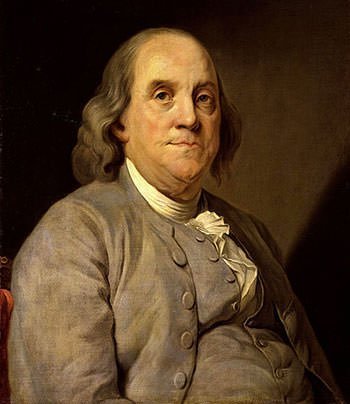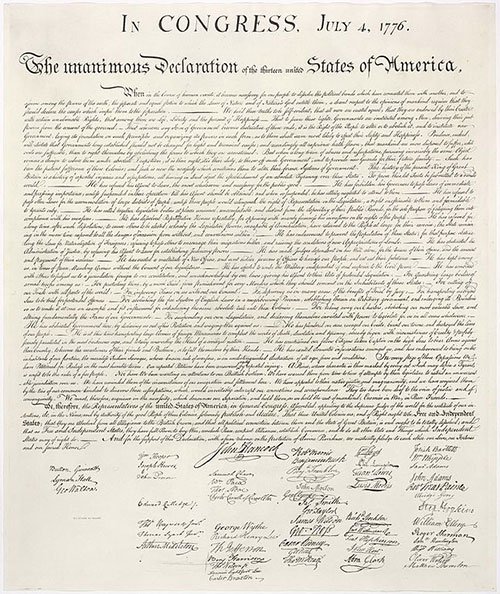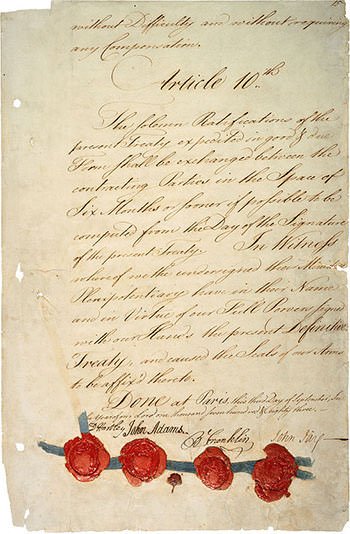Benjamin Franklin (January 17, 1706 – April 17, 1790) was an American polymath who played a key role in the American Revolution as a writer, political philosopher and diplomat. Prior to the Revolution, Franklin had invented numerous things and was a leading writer. When the American Revolutionary War began, Franklin was unanimously elected by the Pennsylvania Assembly as their delegate to the Second Continental Congress. It decided to issue a declaration of independence and Franklin was one of the five members who were appointed to draft it. In December 1776, Franklin was sent to France as the first U.S. Ambassador. He was much admired in France; and played a prominent role in negotiating a permanent military alliance with France in early 1778. French assistance was instrumental in the victory of the American colonies over Great Britain. Franklin was also one of the representatives from U.S. who signed the Treaty of Paris in 1783, which, among other things, brought the war to an end and made Britain acknowledge U.S. colonies as free, sovereign and independent states. Here is a summary of the role of Benjamin Franklin during the American Revolution.
Stamp Act of 1765
Join, or Die, the first political cartoon in America, was created by Benjamin Franklin and was published in a newspaper on May 9, 1754. The cartoon later became a symbol of colonial unity during the American Revolution and remains popular. In 1757, Franklin went to England to represent the Pennsylvania Assembly as a diplomat in its fight against the descendants of the Penn family over who should represent the colony. In March 1765, the Parliament of Britain passed the Stamp Act which imposed a direct tax on its colonies in British America for the first time. Imposed on all printed materials for commercial and legal use, the tax became highly unpopular in America and there were widespread protests against it. Franklin led the American cause in the Parliament in London and in March, 1766, the Stamp Act was repealed. Due to this Franklin emerged as the leading spokesman for American interests in England.

Supporting The American Cause In England
Two years after the repeal of the Stamp Act, Franklin penned a pamphlet titled, “Causes of the American Discontents before 1768”. This made him even more popular in the colonies and he was also appointed by Massachusetts, Georgia and New Jersey as their agent in Britain. In 1773, Franklin published two of his most celebrated pro-American satirical essays: “Rules by Which a Great Empire May Be Reduced to a Small One” and “An Edict by the King of Prussia”. Massachusetts Governor Thomas Hutchinson had written private letters which proved that the British government planned to crack down on Bostonian rebels. Franklin sent them to America and there was an uproar in Massachusetts when these letters were published in the Boston Gazette in June, 1773. Due to this British Solicitor-General Alexander Wedderburn humiliated Franklin in front of the Privy Council on January 29, 1774. The following year Franklin gave up on resolving the conflict amicably and decided to return to America.
Declaration of Independence
By the time Benjamin Franklin arrived in Philadelphia on May 5, 1775, the American Revolutionary War had began with the Battles of Lexington and Concord on April 19, 1775. Franklin was unanimously elected by the Pennsylvania Assembly as their delegate to the Second Continental Congress, which was a convention of representatives from the Thirteen Colonies to manage their war efforts against Britain. It decided to issue a declaration of independence and Franklin was one of the five members who were appointed to draft it. Though much of it is written by Thomas Jefferson, Franklin reviewed Jefferson’s original version and suggested several significant changes. The United States Declaration of Independence, announcing that the colonies regarded themselves as independent sovereign states, was adopted on July 4, 1776. It went on to be regarded as one of the most influential documents in world history.

American Commissioner To France
In December 1776, Franklin was dispatched to France as commissioner for the United States. This effectively made him the first American ambassador to France. Franklin was well received in Paris due to his intellectual standing in the scientific community, among other things. He socialized with the elite in the French capital and moved freely in influential circles. Franklin played a prominent role in the development of positive relations between America and France. He negotiated a permanent military alliance with France in early 1778. French assistance proved to be instrumental in the victory of the American colonies over Great Britain. The efforts of Benjamin Franklin thus proved vital in the American Revolution.

Treaty of Paris
The American Revolutionary War was officially brought to an end with a set of treaties known as the Peace of Paris, which were signed in 1783 and 1784. Of these, the most important was the Treaty of Paris, which was signed on September 3, 1783 by the representatives of King George III of Great Britain and representatives of the United States of America. The article 1 of this treaty acknowledged the existence of United States’ as free, sovereign and independent states. Among other things, the Treaty of Paris set the boundaries between the British Empire in North America and the United States of America. Historians consider that the Treaty of Paris to be very generous to the United States in terms of greatly enlarged boundaries. The adept diplomacy of Franklin contributed to the peace treaty being favorable to America. Franklin is the only Founding Father who is a signatory of all four major documents of the founding of the United States: the Declaration of Independence, the Treaty of Alliance with France, the Treaty of Paris and the United States Constitution. In independent America, Franklin served as the sixth Governor of Pennsylvania from 1785 to 1788.

